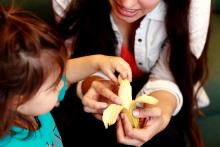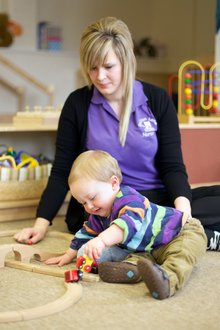Establishing good bedtime routines from an early age aids restful sleep and promotes good habits as your child grows, writes Dorothy Lepkowska.
It’s never too early to set up a regular bedtime routine for your child.
While children need different amounts of sleep at different ages, doing the same relaxing things every evening can help to promote good sleep from the time they are a baby.
When my daughter was a few weeks old, a friend rang one evening for a chat, expecting my child already to be in bed. It was around 9pm and she was shocked to find she wasn’t in her room. I was shocked that she was shocked – after all, babies sleep a lot during the day, and I believed keeping her up a little longer in the evening would help her sleep at night.
My friend told me her children, who were toddlers at the time, were always in bed before 7pm even as babies.
Her advice transformed my life.
Not only did my daughter sleep better – and often right through the night – once I’d set up a regular bedtime, but I also had time to do the things I needed to do in the evening, including spending time with my partner.
Of course, we still had to play things by ear while she needed to feed overnight, but having a routine proved beneficial to us all.
Establishing habits
Experts believe that two to four-year-olds should be in bed no later than around 7.30pm, with a half-hour build-up beforehand to help them get ready for sleep.
Encourage calm activities as their day draws to a close, rather than games that might stimulate or over-excite.
As bedtime approaches remind them that they have another five minutes to play before they need to get ready. If your child is already using devices to play games, take these away an hour before bedtime.
Reading a story or a warm bath – or both — is a good way to help them relax.
Using gentle reminders of what they need to do, such as “sit on your potty”, “brush your teeth now”, “put on your pyjamas” helps to build up a routine over time.
Your little one starts to understand that this is what happens before bedtime, and it can help to teach good personal habits as they grow older.
Keep things calm
Try not to hurry them along.
Some children will stall for time if they don’t want to go to bed yet, so be firm but calm.
Once in the bedroom, ensure the lights are low as dim light encourages the sleep hormone, melatonin, and that it’s a peaceful and quiet environment.
Now is a good time to read a story or have a chat about the nice things you did together during the day, or even to sing them a little song in a hushed tone. It helps to end the day in a positive and content way.
A cuddle and a kiss indicate that it’s time to sleep and that you’re saying “goodnight” and going to leave the room. If they complain about being left alone, reassure them that you will check on them in a few minutes.
Feeling safe and secure
Some children don’t like being in the dark so use a night light, or keep the light switched on in the hallway or landing, with the door ajar. The room temperature should be a comfortable 16 to 20 degrees centigrade for restful sleep.
Having a routine will also help when you child has to sleep away from home, for example when visiting relatives or going away on holiday. Knowing what happens at bedtime can remove some of the disruptions of being away from familiar surroundings.
If, despite all this, your child finds getting to sleep at night difficult, then talk to your health visitor or GP in the first instance. They may decide to refer you to a specialist.
How much sleep does your child need?
One week
daytime: 8 hours
night-time: 8 hours 30 minutes
4 weeks
daytime: 6 to 7 hours
night-time: 8 to 9 hours
3 months
daytime: 4 to 5 hours
night-time: 10 to 11 hours
6 months
daytime: 3 hours
night-time: 11 hours
9 months
daytime: 2 hours 30 minutes
night-time: 11 hours
12 months
daytime: 2 hours 30 minutes
night-time: 11 hours
2 years
daytime: 1 hour 30 minutes
night-time: 11 hours 30 minutes
3 years
daytime: 0 to 45 minutes
night-time: up to 12 hours
4 years
night-time: 11 hours 30 minutes
5 years
night-time: 11 hours
Further reading
NHS — Healthy sleep tips for children
BabyCentre — Bedtime routines for toddlers







